
Pathogens
Scope & Guideline
Bridging Science and Application in Pathogen Research
Introduction
Aims and Scopes
- Epidemiology and Public Health:
Research focusing on the distribution, determinants, and control of infectious diseases in populations, including studies on outbreaks, prevalence, and risk factors. - Host-Pathogen Interactions:
Investigations into the mechanisms by which pathogens invade, survive, and cause disease in hosts, including immune responses and pathogen evasion tactics. - Microbial Genetics and Genomics:
Exploration of the genetic and genomic characteristics of pathogens, including studies on resistance mechanisms, virulence factors, and evolutionary dynamics. - Therapeutic Development and Antimicrobial Resistance:
Research aimed at developing new therapeutic agents, vaccines, and understanding antimicrobial resistance trends among pathogens. - Environmental and Zoonotic Pathogens:
Studies on the transmission dynamics of pathogens between animals and humans, focusing on zoonotic diseases and environmental factors affecting pathogen spread. - Clinical and Diagnostic Innovations:
Research on novel diagnostic methods, clinical management strategies, and the evaluation of therapeutic interventions for infectious diseases.
Trending and Emerging
- Multispecies and Co-Infection Studies:
There is a growing interest in understanding the interactions between multiple pathogens within hosts, which informs treatment approaches and epidemiological models. - Microbiome Research:
Increasingly, studies are focusing on the role of the microbiome in health and disease, particularly how it influences susceptibility to infections and responses to treatment. - Vaccine Development and Evaluation:
Research on innovative vaccine candidates, including mRNA vaccines and novel delivery systems, is trending, particularly in light of the COVID-19 pandemic. - Environmental Surveillance for Pathogens:
Emerging interest in environmental monitoring of pathogens, particularly through wastewater surveillance, is becoming a critical area of research for early detection of outbreaks. - Antimicrobial Resistance Mechanisms:
Research focusing on understanding the mechanisms behind antimicrobial resistance is expanding, aiming to provide insights for developing new therapeutic strategies. - Technological Innovations in Pathogen Detection:
The integration of advanced technologies such as CRISPR, next-generation sequencing, and bioinformatics in pathogen detection and characterization is increasingly prevalent.
Declining or Waning
- Traditional Pathogen Control Methods:
There is a noticeable decrease in publications focusing solely on traditional methods of pathogen control, such as chemical treatments and antibiotics, as newer, innovative approaches gain traction. - Historical Epidemiological Studies:
Research that solely emphasizes historical data without integrating modern techniques or insights into current public health challenges is becoming less common. - Infection Control in Non-Human Hosts:
Studies focused on infection control measures in non-human hosts, such as agricultural animals, are appearing less frequently as the emphasis shifts towards human health and zoonotic transmission. - In Vitro Models for Pathogen Research:
While still relevant, there has been a shift away from reliance on in vitro models toward more complex in vivo systems that better mimic real-world conditions. - Single Pathogen Focus Studies:
Research that concentrates on a single pathogen without considering co-infections or broader ecological interactions is on the decline, as the complexity of infectious diseases is increasingly recognized.
Similar Journals

Infection and Drug Resistance
Empowering researchers with vital knowledge in pharmacology.Infection and Drug Resistance, published by DOVE MEDICAL PRESS LTD, is a leading open-access journal dedicated to the critical fields of infectious diseases and pharmacology. Since its establishment in 2008, this journal has emerged as a vital resource for researchers, professionals, and students alike, offering thorough insights into the mechanisms of drug resistance and the effectiveness of various therapeutic interventions. With an impressive 2023 impact factor placing it in the Q2 category across multiple relevant disciplines, including Infectious Diseases and Pharmacology, it serves as a significant platform for high-quality research dissemination. Infection and Drug Resistance aims to foster a deeper understanding of the evolving challenges in managing infectious diseases and enhancing drug efficacy, contributing to the global discourse on public health. The journal's commitment to open access ensures that vital knowledge is readily available to promote broader scholarly engagement and innovation.

Infectious Disease Reports
Leading the charge in infectious disease research and collaboration.Infectious Disease Reports is a premier open-access journal published by MDPI, dedicated to advancing the field of infectious diseases. Since its inception in 2009, this journal has established itself as a significant platform for disseminating cutting-edge research, reviews, and case studies, critical for global health. With a commendable Q2 ranking in the category of Infectious Diseases and a Scopus rank of #140 out of 344, it is recognized for its impactful contributions to medical research, holding a 59th percentile in its field. The journal aims to provide comprehensive insights into various dimensions of infectious diseases, ranging from epidemiology to novel treatment modalities. As an open-access publication, Infectious Disease Reports ensures that its articles are freely available to a wide audience, fostering collaborative efforts among researchers, healthcare professionals, and students worldwide. With its ongoing commitment to excellence, the journal plays an essential role in shaping the future of infectious disease research.
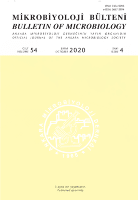
MIKROBIYOLOJI BULTENI
Shaping the Future of Microbial ScienceMIKROBIYOLOJI BULTENI, with ISSN 0374-9096, is a prestigious academic journal published by the ANKARA MICROBIOLOGY SOC, located in Ankara, Turkey. Established in 1973, this journal has been a vital conduit for disseminating research in the fields of Immunology, Microbiology, and Infectious Diseases, garnering a reputation as a significant contributor to the scientific community. The journal is currently ranked in the Q3 category within Immunology and Microbiology (miscellaneous), and Infectious Diseases, indicating its impactful presence amidst contemporary research. With access options that may be restricted, MIKROBIYOLOJI BULTENI actively welcomes submissions that advance the understanding of critical microbiological principles and practices, thereby supporting both national and international research efforts. Researchers, professionals, and students are encouraged to explore the latest findings shared in this journal, as it continually shapes the landscape of microbiology and infectious disease studies through its comprehensive and rigorous peer-reviewed publications.
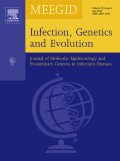
INFECTION GENETICS AND EVOLUTION
Unlocking the Secrets of Infection and AdaptationINFECTION GENETICS AND EVOLUTION is a premier scholarly journal published by Elsevier, focusing on the dynamic field of infection genetics and evolutionary biology. Since its inception in 2001, this journal has emerged as a critical platform for the dissemination of cutting-edge research, bridging the gap between molecular genetics, evolutionary theory, and infectious disease study. With an influence profound enough to secure its status in the Q1 category for Ecology, Evolution, Behavior and Systematics and impressive Q2 rankings in Genetics, Infectious Diseases, and Microbiology, the journal offers researchers unparalleled insights that advance the understanding of pathogen evolution and host interactions. Despite the lack of Open Access, the research published in this journal significantly contributes to the academic discourse and informs public health approaches. By publishing high-quality studies and reviews through 2024, INFECTION GENETICS AND EVOLUTION remains indispensable for academics, professionals, and students seeking to explore the intricate mechanisms of infection and adaptation in various organisms.
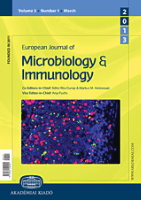
European Journal of Microbiology and Immunology
Enhancing Understanding of Microbial DiseasesWelcome to the European Journal of Microbiology and Immunology, a premier platform dedicated to advancing the field of microbiology and immunology through the dissemination of high-quality research. Published by AKADEMIAI KIADO ZRT in Hungary, this journal serves as an essential resource for researchers, professionals, and students alike, fostering scholarly communication and innovation in these critical areas of medical science. The journal, which holds an ISSN of 2062-8633, presents rigorously peer-reviewed articles that contribute to our understanding of microbial diseases, immune responses, and related fields, currently ranking in the Q2 and Q3 quartiles across multiple categories such as immunology and microbiology. By embracing an inclusive scholarly dialogue and offering a robust readership, the European Journal of Microbiology and Immunology aims to inspire the next wave of discoveries and collaborations within the global scientific community.
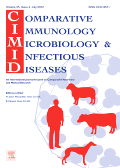
COMPARATIVE IMMUNOLOGY MICROBIOLOGY AND INFECTIOUS DISEASES
Pioneering Discoveries in Infectious Disease ResearchComparative Immunology Microbiology and Infectious Diseases, published by Elsevier Science Ltd, is a prominent journal dedicated to advancing the fields of immunology, microbiology, infectious diseases, and veterinary sciences. Established in 1978, this journal has become a vital resource for researchers and professionals alike, with a commendable impact factor that reflects its significance in academia. The journal, available in both print and electronic formats (ISSN: 0147-9571, E-ISSN: 1878-1667), stands out for its commitment to disseminating innovative research findings, particularly through its categorization in Q2 and Q3 quartiles across various related disciplines as of 2023. The journal aims to provide insightful comparative analyses that enhance our understanding of host-pathogen interactions, immune responses, and disease manifestations. With a global readership base, it serves as a platform for collaborative discourse among scientists and professionals, ultimately contributing to the improvement of health outcomes worldwide.
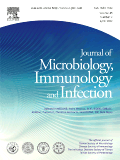
JOURNAL OF MICROBIOLOGY IMMUNOLOGY AND INFECTION
Connecting researchers to advance immunological science.Welcome to the Journal of Microbiology Immunology and Infection, a premier academic publication established in 1998 and now proudly owned by Elsevier Taiwan. As an Open Access journal since 2016, it provides unrestricted access to groundbreaking research in the fields of immunology, microbiology, and infectious diseases, making it an essential resource for researchers, practitioners, and students alike. The journal holds impressive rankings, including Q1 status in categories such as Infectious Diseases and Microbiology (medical), and a notable 92nd percentile in its Scopus ranking for Medicine - Infectious Diseases. With a dedicated focus on advancing knowledge and fostering collaboration within the scientific community, the Journal of Microbiology Immunology and Infection is committed to publishing high-impact research that significantly influences practice and policy in healthcare and life sciences. The journal is also recognized for its contribution to the ongoing dialogue surrounding contemporary issues in immunology and infection, positioning it as a vital platform for scholarly exchange and innovation.

Current Clinical Microbiology Reports
Empowering Research for Infectious Disease SolutionsCurrent Clinical Microbiology Reports, published by Springer, is a leading international journal dedicated to advancing the field of clinical microbiology. With a focus on the diagnosis, treatment, and prevention of infectious diseases, this journal serves as a vital resource for researchers, medical professionals, and students engaged in microbiological studies. As a testament to its quality and influence, it holds an impressive impact factor and ranks in the Q1 category in both Infectious Diseases and Microbiology (medical), reflecting its prominent standing in the scholarly community. Additionally, it features a commendable Scopus ranking, placing it in the 77th percentile for Medicine - Infectious Diseases and the 69th percentile for Medicine - Microbiology (medical). With contributions spanning over a decade, from 2014 to 2024, the journal continues to publish high-quality research articles that shape the future of clinical practices and public health policies. While access options are variable, the journal's commitment to open dialogue and dissemination of knowledge makes it a pivotal platform for those passionate about tackling microbial challenges in healthcare.
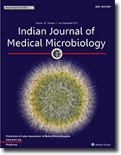
Indian Journal of Medical Microbiology
Exploring Innovations in Infectious Diseases and ImmunologyIndian Journal of Medical Microbiology, published by Elsevier, is a pivotal peer-reviewed journal dedicated to the field of medical microbiology, providing a vital platform for research and scholarship since its inception in 1986. With an Open Access model established in 2001, it ensures the dissemination of scientific knowledge to a global audience, enhancing accessibility for researchers, professionals, and students alike. The journal's scope spans critical areas including immunology, infectious diseases, and microbiology, with an impressive trajectory marked by converged years of publication allowing for a comprehensive exploration of evolving scientific trends. As of 2023, the journal holds a Q3 ranking in Infectious Diseases and Microbiology (medical) and a Q4 ranking in Immunology and Microbiology categories, reflecting its significant yet growing impact in the field. Researchers seeking to contribute to or stay updated on the latest advancements in medical microbiology will find the Indian Journal of Medical Microbiology a valuable resource, as it consistently bridges the gap between emerging science and clinical application.

Emerging Microbes & Infections
Transforming understanding of infectious challenges.Emerging Microbes & Infections is a premier open access journal, published by Taylor & Francis Ltd since 2012, dedicated to advancing the understanding of microbial infections and their implications in human health. With an impressive Q1 ranking across multiple categories—including Drug Discovery, Epidemiology, Immunology, and Infectious Diseases—this journal is at the forefront of research in the microbiological sciences. Covering a diverse range of topics, it serves as a vital resource for researchers, healthcare professionals, and students alike. The journal's commitment to open access ensures worldwide dissemination of cutting-edge findings, fostering collaboration and innovation in tackling challenges posed by emerging infections. As part of the thriving academic community in the United Kingdom, Emerging Microbes & Infections plays a crucial role in shaping the future of infectious disease research and public health.